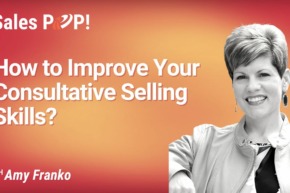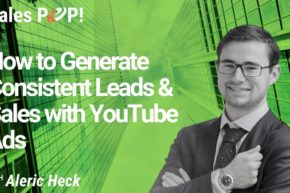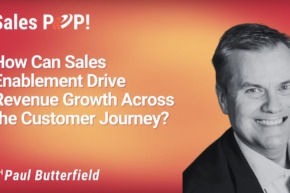Let’s be honest: the old sales playbook is gathering dust. The slick pitches, the aggressive closes, the “always be closing” mantra—they feel out of place in a world where buyers are more informed and skeptical than ever. The role of a salesperson isn’t just evolving; it’s being completely redefined.
So, what does it take to win in this new era?
We dove into this very question, drawing from a robust conversation between Sales POP! host John Golden and Rob Herbst, a 34-year sales veteran and founder of SPA Selling. What emerged wasn’t a list of new tricks or hacks, but a fundamental shift in mindset, skills, and culture. This is your guide to mastering the future of sales.
1. Stop Solving Problems. Start Finding Them.
For decades, salespeople have proudly worn the “problem solver” badge. A customer identifies a need, and we swoop in with the perfect solution. But according to Herbst, the most valuable professionals today have moved beyond that. They are problem finders.
Think of it like this: a problem solver is a pharmacist, dispensing a prescription for a known ailment. A problem finder is a diagnostician, running tests and asking probing questions to uncover the root cause of symptoms the patient didn’t even know were connected.
By bringing an outside perspective, you can identify blind spots, challenge outdated assumptions, and surface hidden opportunities your customers have completely overlooked. This is where true value is created—not in fulfilling an order, but in revealing a path to improvement they couldn’t see on their own.
How to make the shift:
- Go beyond the surface. Ask open-ended questions that explore their world: “Walk me through your current process,” or “What’s one thing that, if it were improved, would have the biggest impact on your team?”
- Gently challenge their assumptions. Don’t just accept their initial assessment. Validate their concerns, but also ask, “Have you considered how this issue might be affecting other departments?”
- Document your discoveries. The problems you unearth become powerful case studies that build unshakable trust.
2. Make AI Your Sidekick, Not the Hero
Artificial intelligence is no longer a futuristic concept; it’s a daily tool. AI is brilliant at handling the grunt work—automating research, scoring leads, and personalizing outreach at scale. It’s an incredible efficiency booster.
But Herbst offers a crucial warning: AI can’t build rapport. It can’t read the hesitation in a client’s voice or understand the complex internal politics influencing a decision. It lacks empathy.
The future-focused salesperson leverages AI to free up their time for the uniquely human work: deep listening, navigating complex stakeholder relationships, and building genuine connections.
Your AI game plan:
- Integrate, don’t abdicate. Use AI tools for data gathering, but always be the one to interpret that data and add your human insight.
- Double down on emotional intelligence. Your ability to connect, empathize, and build trust is your most significant competitive advantage over an algorithm.
3. The Power of a Straight Answer: Setting the Stage for Trust
One of the biggest hurdles in sales is the customer’s defensive wall. They expect a pitch, so they have their guard up. Herbst argues the best way to tear down that wall is with radical transparency.
Start your conversations by clearly stating your role and purpose.
Instead of a vague opening, try something like: “My goal today isn’t to sell you anything. It’s to learn about your operations and see if we can uncover any challenges or opportunities you may not have considered. If we find something significant, we can discuss it. If not, that’s perfectly fine too. Are you open to that?”
This simple act of declaring your intent does three things:
- It resets expectations. You’re not a product-pusher; you’re a strategic partner.
- It fosters collaboration. You’re inviting them into a joint diagnostic process.
- It reduces defensiveness. It encourages open, honest dialogue from the very beginning.
4. Master the Lost Arts: Listening, Observing, and Being Curious
In our world of back-to-back Zoom calls and constant notifications, deep listening has become a superpower. It’s not just about hearing words; it’s about understanding the meaning behind them.
Digital communication can make this tough. It’s easy to get distracted or miss the subtle non-verbal cues you’d catch in person. That’s why mastering the fundamentals of conversation is more critical than ever.
- Active Listening: Turn off notifications—close other tabs. Focus entirely on the person speaking. When they finish, summarize what you heard—”So, if I’m understanding correctly…”—to confirm you’re on the same page.
- Observation: Pay attention to what isn’t being said. A long pause, a change in tone, or a hesitant answer can reveal more than a direct statement.
- Insatiable Curiosity: This is the engine that drives everything. The best salespeople have a genuine desire to understand their customers’ world. Constantly ask “why” like a curious child to get to the root of an issue.
5. Culture Isn’t a Buzzword; It’s Your Bottom Line
You can have the most skilled salespeople in the world, but if your culture is broken, you’ll never achieve sustainable success. Herbst identifies three unshakable anchors of a high-performance sales culture:
- Personal Development: Great teams are committed to continuous learning. This goes beyond product knowledge. It means investing in communication skills, negotiation tactics, and self-improvement.
- Crystal-Clear Expectations: Everyone on the team should know exactly what’s expected of them and what success looks like. This isn’t about micromanaging; it’s about providing a clear, objective framework for performance, much like a professional athlete tracking their stats.
- Visible Achievement: Celebrate the wins, big and small. Public recognition—whether it’s a shout-out in a team meeting, a creative Slack emoji, or hitting a team goal thermometer—builds morale, fosters healthy competition, and strengthens team cohesion.
The Bottom Line: Be Proudly, Authentically Human
Sales often gets a bad rap, but at its core, it’s an honest profession. You are helping businesses solve meaningful problems. Own the title of “salesperson” with pride.
The future doesn’t belong to the slickest talker or the most aggressive closer. It belongs to the deeply curious, the relentlessly helpful, and the authentically human professional who understands that the real work begins long before the close. It starts with finding the problem no one else could see.
Our Host
John is the Amazon bestselling author of Winning the Battle for Sales: Lessons on Closing Every Deal from the World’s Greatest Military Victories and Social Upheaval: How to Win at Social Selling. A globally acknowledged Sales & Marketing thought leader, speaker, and strategist, he has conducted over 1500 video interviews of thought leaders for Sales POP! online sales magazine & YouTube Channel and for audio podcast channels where Sales POP! is rated in the top 2% of most popular shows out of 3,320,580 podcasts globally, ranked by Listen Score. He is CSMO at Pipeliner CRM. In his spare time, John is an avid Martial Artist.








Comments